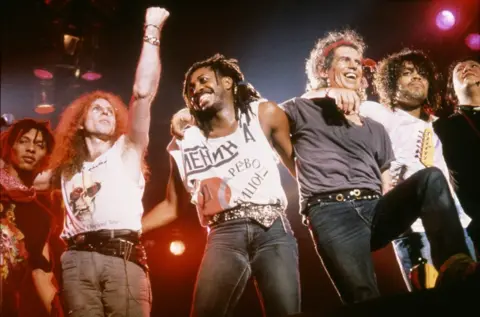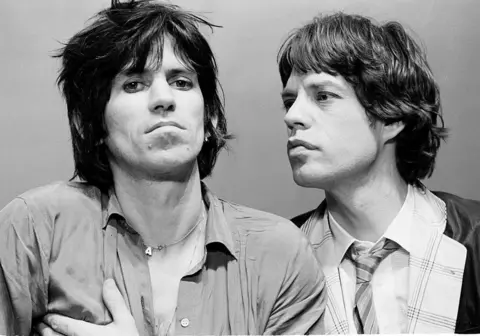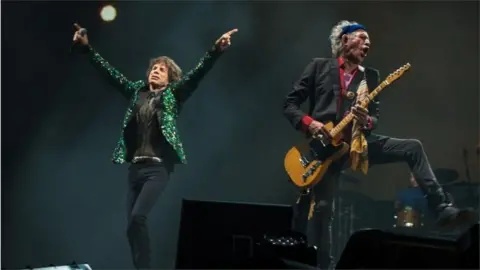Keith Richards: 'I'll celebrate the Stones' 60th anniversary in a wheelchair'
 Getty Images
Getty ImagesDuring the Rolling Stones' 1976 tour of Europe, at a show in Germany, Keith Richards fell asleep on stage.
He'd never been a particular fan of Fool To Cry - a single from their recent Black and Blue album - and, after playing his solo, the guitarist simply nodded off.
A couple of minutes later, he awoke to a huge scream of feedback. Richards has drifted away with his foot jammed onto an effects pedal, causing an almighty squeal that reverberated painfully around the arena.
For all of the tales of Richards' hedonism and debauchery, this onstage blackout was completely out of character.
"Keith will always flog himself to death on stage. Always," the Stones' road manager Ian Stewart told Richards' biographer, Barbara Charone.
"Some night he'll move and other nights he'll stand and play, Some nights he might be a bit out of it and drop the odd clanger but he never coasts."
Even at the age of 76, the guitarist still lives for the road. The stage is where he feels most at home, and the thrill of an audience has never faded.
"I don't know if you can get immune to it, but it's still a kick, man," he says.
Thanks to the pandemic, however, the star's "usual yearly shot" of adrenalin has vanished. "We was ready, primed to go on the road when this virus hit, so it was kind of, 'On your marks, get set, no'. It's been very weird for everybody this year, hasn't it?"
'No rest for the wicked'
The star has been riding out quarantine in his home in Connecticut, reading the Master and Commander series of historical novels, while occasionally writing music, and watching the US Presidential election with the curious detachment of a resident alien.
"Oh man, it's crazy," he laughs. "I don't even want to go into it. I'm hiding."
To compensate for the lack of new concerts, Richards has overseen the reissue of a classic live album, recorded with his other band, The X-Pensive Winos, in 1988.
It's a loose, soulful record, that provides a rare chance to experience Richards as the focal point of a band... Not that he was necessarily comfortable with that role.
"It was the first time I'd ever had to be the frontman so I learned an awful lot about Mick [Jagger]'s job," he says. "You've got to be on the case all the time.
"With The Stones, I can sort of step forward or hunker down back with Charlie [Watts]. But I realised that when you're number one, well, there's no rest for the wicked."
 Paul Natkin
Paul NatkinThe album was recorded at a pivotal time in Richards' life. He had recently kicked heroin, was estranged from Jagger (the song You Don't Move Me was written about their feud) and was a new father to two daughters, Theodora Dupree and Alexandra Nicole, born in 1985 and 1986 respectively.
On stage, meanwhile, he was enjoying playing smaller venues than the football stadiums that had become the Stones' stomping grounds.
"I still love playing clubs, just for atmosphere, and the sounds," he says.
Biffed by Berry
The live album was recorded at the Hollywood Palladium in Los Angeles, whose wooden floors "convey sound beautifully," the guitarist enthuses.
It also boasts, he notes on the record, "a stage I've been thrown off many times" - a reference to the time he attempted to get up and play with his idol, Chuck Berry, only to be forcibly removed from by security guards.
"I didn't know who he was," the blues legend later recalled. "I thought the cat had something, but I couldn't even recognise him."
It wasn't their only run-in. "I once made the mistake of touching his guitar while he was out the dressing room and he came back and whacked me," Richards recalls.
"But it was alright. We were friends enough to swallow it all - because after that I did Hail, Hail Rock and Roll [a concert movie filmed on Berry's 60th birthday] with Chuck, so we made it up."
Allow Google YouTube content?
The Winos were an anomaly in the late 80s - eschewing the gaudy, programmed production that had seduced many rock bands, and doubling down on Richards' love of the blues.
He also drafted in some of the greatest names in funk, from bassist Bootsy Collins to James Brown's saxophonist Maceo Parker. From the perspective of 2020, it gives the records a timeless quality, unmoored from the excesses of the era - but it also highlights Richards continued championing of black music and black civil rights.
On their early US tours, the Stones even had a clause in their contract stipulating they wouldn't play in segregated venues. If they arrived to find the promoter had reneged on the agreement, they could walk away with a guaranteed fee of $40,000 (£30,100) without playing.
"You did notice certain things in the air," Richards recalls of that era, "like 'white-only' restaurants or johns or stuff. It was pretty blatant. Just endemic, systematic. So that's what they're dealing with now, you know?"
He's therefore encouraged by the Black Lives Matter movement, and the protests followed the deaths of George Floyd and Breonna Taylor earlier this year.
"It's about time, you know? The kids are doing something, It's amazing things going on. It's a bit like Alice in Wonderland, actually." (Ever the enigma, he offers no explanation of this last statement, simply repeating it as if the meaning should be apparent to everyone).
Stumbling into songwriting
Talk turns to the future of the Rolling Stones. Earlier this year, the band released a sparse, funky new single, Living In A Ghost Town, prompted by the initial stages of the lockdown
Their first new material in eight years, it was taken from sessions for a proposed studio album - but the pandemic has put those plans on ice.
"With The Stones really, they have to be in the same room to play," Richards explains. "I've been in touch with Mick and Ronnie [Wood] and I'm trying to figure out if we could pull a session together in the next few weeks - but it's all a bit of an experiment really."
 Getty Images
Getty ImagesStill, he writes all the time, keeping two or three guitars "lying around the house in strategic spots, in case I feel like grabbing one".
"Being a songwriter is one of those things," he says. "You can hear somebody say something in the kitchen and by the time you get to the living room, you've got a song going."
Famously, Richards stumbled into songwriting. The bulk of the Stones' first two albums were composed by others. Then, spurred on by the example of Lennon and McCartney (who wrote the band's first top 20 hit I Wanna Be Your Man) Jagger and Richards bashed out an original of their own.
The result was As Tears Go By, taken into the charts by Marianne Faithfull, and from there one of rock's greatest songwriting partnerships was born. Within a couple of years, they'd written classics like Paint It Black, Get Off My Cloud and (I Can't Get No) Satisfaction, the riff for which came to Richards in his sleep.
"It was a lucky find, I must admit," he says.
He claims never to have studied songwriting, relying instead on his instincts. "You know, just grabbing it out of the air and you don't know where it came from. It's a beautiful mystery," he says.
 Getty Images
Getty ImagesSo has he made plans to celebrate the Stones' 60th anniversary when it rolls around in 2022?
"I hadn't even thought about it!" he chuckles. "I don't know. I might get a new wheelchair."
Pausing for a moment, he tackles the question again. This time, a hint of wistfulness creeps into his voice.
"Yeah, it's been pretty exceptional this particular life. I'm really at a loss sometimes to sort of figure out how the hell I got here.
"But the music is the thing that keeps you going, so that's what I try and concentrate on."
Keith Richards and The X-Pensive Winos, Live at the Hollywood Palladium, is out now.

Follow us on Facebook, or on Twitter @BBCNewsEnts. If you have a story suggestion email [email protected].
